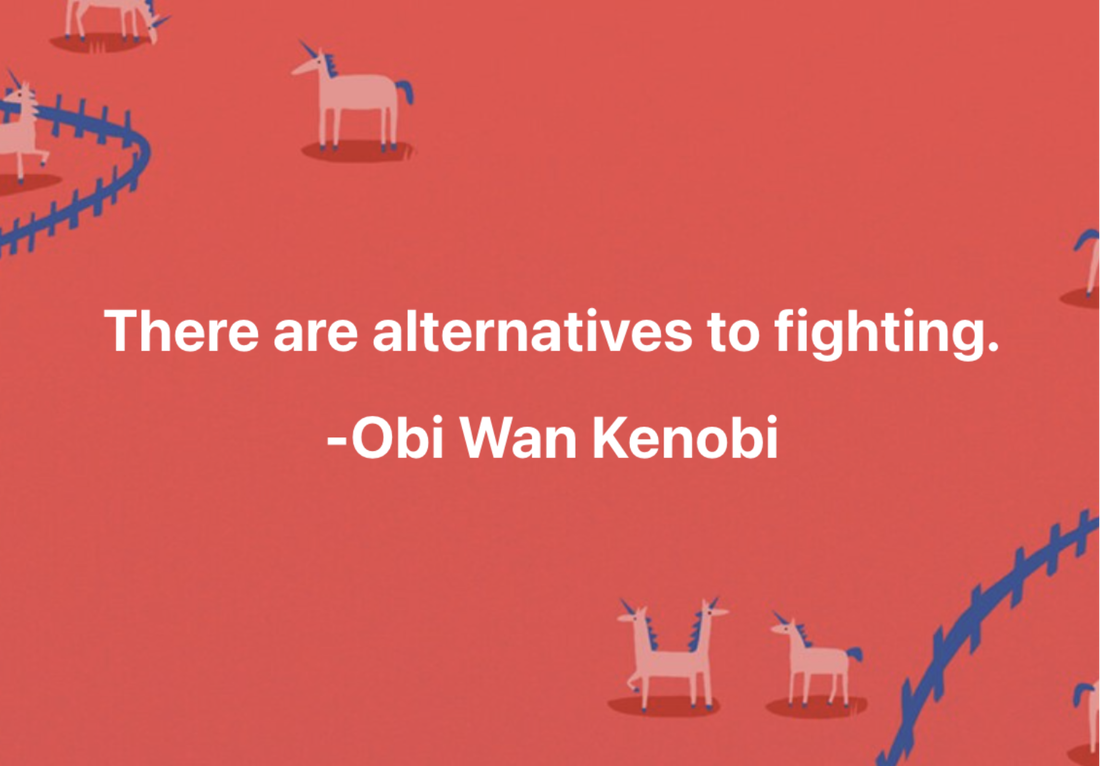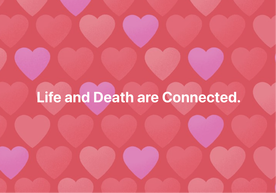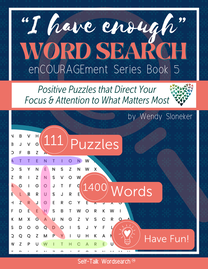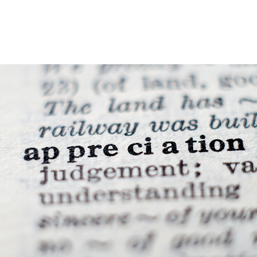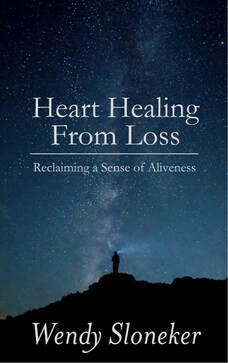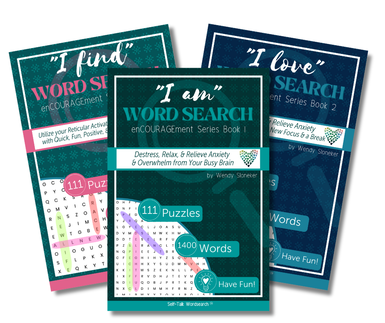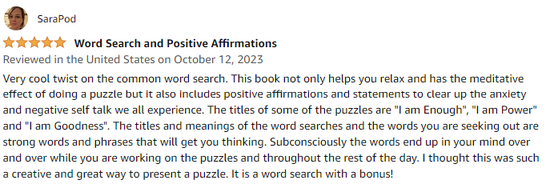|
Fictional characters of many kinds can count as coaches-from-afar.
Obi Wan Kenobi is one such guide for me. December is Star Wars month in our house. Similar to Die Hard counting as a Christmas movie (it is in our house). Anywhoo … tonight is OG Star Wars …. Now aka as A New Hope. The above makes sense to me and I appreciate the reminder…. Which sometimes feels like a challenge. They do call it “The Resistance” for a reason, right? (Life Coaching, self development, & spiritual paths are everywhere.) That’s all for now, friends. Thinking of you and us and me too. Happy Almost 2024 to each and all of us! *** Private support starts with a call for just us. Pick a time and we'll talk about working together directly: https://calendly.com/wendy-sloneker/45minconnectioncall It's totally possible to overthink this. And I don't recommend it. (ask me how I know)
Feel for resonance. Allow that to be enough. Even for a minute. Long enough to catch your breath. Feel a sense of peace in a truth that you now remember. So much of what we (I) squirm about is actually out of our control... and/or none of our business. Returning to the realness and reliability (is that a word?) of change... & how we flow with it, even when we don't like it or are weary, fragile, and scared... is part of how we move toward new freedom, and a new sense of aliveness. This is not about strength or a push to be strong. This is about being real, and present... and alive. Right now. *** Private support starts with a call for just us. Pick a time and we'll talk about working together directly: https://calendly.com/wendy-sloneker/45minconnectioncall  Hi. I wanted to talk with you this week about the concept of new life, as it pertains to feelings of fresh aliveness. Context: A bit of chaos I, like many, have been in the swim, swirl, and (sometimes) drain of preparing for holiday and end-of-year visits, events, and gifting. Circumstances at play for me these days also include, an aging dog with new medications, lots of rain, gifts that needed shuttling or posting, etc, etc. It’s been hustley-shuffle-y for a few weeks. Busy, bustle-y, and it’s created some chaos in the house, the car, and my bag, which is usually close-by in the house and always on me when I’m out and about. Smoothing out and sifting through This morning I was able to give my bag (which I call a purse these days) a complete empty out & refill. I can’t remember the last time I did this. It took about 12 minutes. And what I literally found were:
What I emotionally and energetically found were:
Value in small steps and tasks - and the gifts that come with clearing All to say, that 12-minute bag-dump and clean out on the couch this morning gave me new and clear awareness for what:
What is already here for you? The above is a generalized kind of reflection of what I do with my private clients when they are navigating grief, loss, and shadow seasons. AND an actual corner, bag, drawer, or bin review & clear out can give you many of the same experiences and elements I received this morning. Including self-awareness, clarity, and choice about what it is you are willing to continue to carry… either literally or emotionally. You’ll have more and new space. And a new sense of more spaciousness with this new awareness… and the choice you have to continue or gently shift, as feels most comfortable and right to you. It counts as expansion, love. It counts when you count it. And I hope that you will. *** Ready for private support with me? Reclaim a sense of aliveness and a fresh sense of new life, hope, and energy. Step 1 is to schedule your free call so we can talk about it: https://calendly.com/wendy-sloneker/45minconnectioncall 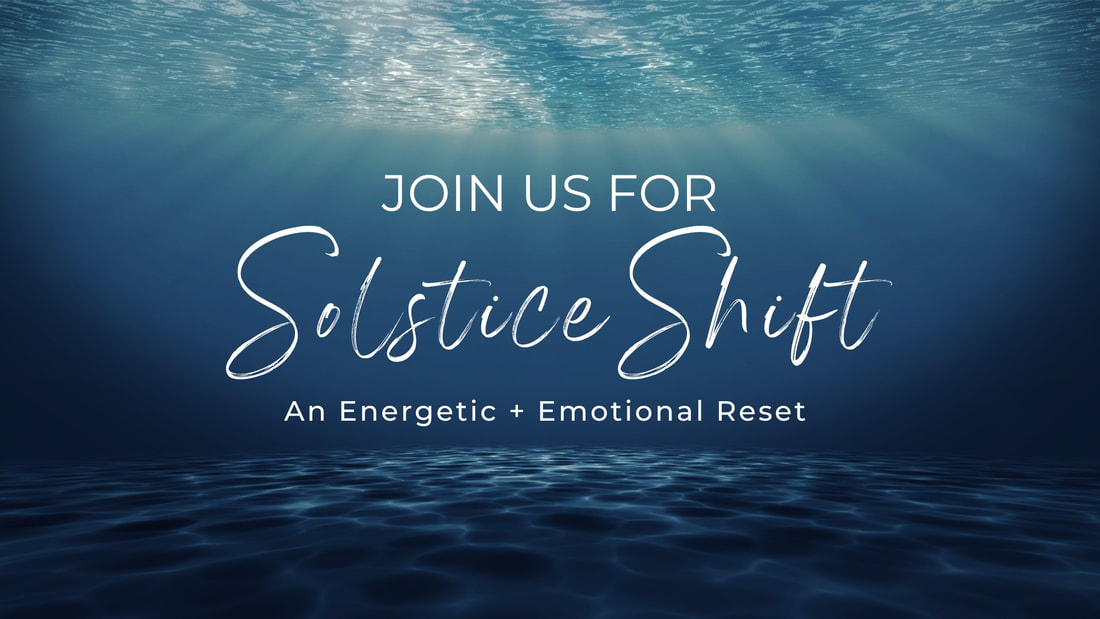 I rarely coach groups. And this cool-aboration (!) with Sarah of The Juicy Good Life is the exception. This is a 3-part short day & an ideal-steal for those feeling restless or overwhelmed in life and business. Here's how the day goes: 1. We create space: A Grief Shifting Session with me - unstick and gently encourage what's no longer working or serving to lift out and away... and it does. (we break for lunch) 2. We reset: Identify and receive new energy & direction with Sarah. Guided coaching, safe sharing, and support are right here. This is another way to practice receiving. (short break) 3. We ground, anchor, and integrate: Allow the final powerful sound experience with Rachelle of The Eclectic Spark LLC. Melt into this restorative & healing session to integrate the shift and new space and new energy... body, mind, & spirit. Separately these sessions would be hundreds of dollars each... or they wouldn't exist. This happens during the imminent change of season. Right on time. Feel drawn to this event experience but aren't sure why? You are not alone. We've welcomed more than one person in each event this year who has felt this way and has absolutely felt held and supported by the group, yes... But more by themselves who opted in and registered without "a reason"... they trusted themselves to show up and get what was needed... And they each received it. They found out why they registered during the event... and they received what they intuitively knew they needed. Feel like you "just can't take the time *because* of overwhelm"? That sounds like the EXACT reason to join us. You may need a break and a rest even more, due to overwhelm. It may seem and feel so backwards. You may also feel defensive or even disgusted. Me too, when I am in overwhelm… and entertaining new options. The compulsion to puuuuuush, defend, and even fight is real and painful and… scary. AND. This is also precisely how you know you’re ONTO SOMETHING (new). Disengage from overwhelm. The Solstice Shift is all about care, support, and receiving. You’ll disengage experientially during our time together. Receive new space, energy, and peace… from the inside, where you can begin to create it for yourself. On demand. Register. Then reset & restore. With us. You already belong. Register here, love. Get yourself some breaktime and breathing room. 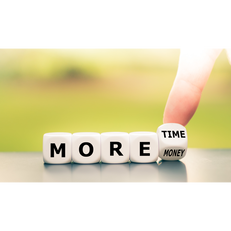 More is coming. There is always more. These are some of my favorite words to work with. Especially when I forget them. They are reminders that are full of resonance and that ring true every time. Even when I have just a fractional belief in them. More life, more change, more money, more time (if I’m lucky), more people, more friends, more ideas, more inspiration, more… More is always coming. There is always more. Will it look exactly the way I think it should? Or the way my mind says… or urgently demands… that “it has to”? I have no idea. Perhaps yes, maybe no. I can’t tell from here. But I know from my whole heart and soul-self that more is coming. There is always more. Unlock your free Gratitude Wordsearch puzzle here. Click, download, print, & play. NEW BOOK RELEASE
Book 5 of Self-Talk Wordsearch is now LIVE and available on Amazon. This is the most “manifest-y” book I’ve published so far. It works with a very subtle, but critical element in the Law of Attraction. It’s the aspect and perspective of “ already having enough” of a desired result. This is notoriously difficult for us humans. It’s the part and place where many give up on working with LOA altogether. More specific thoughts, perspectives, openings, and yes, self-talk is how we can more easily develop our skills. Including the belief of already having enough. When we decide we have enough (love, time, money, etc) -even just enough for this moment - we create capacity for more. We also allow for more to come. When we have enough, we create more than enough. This may sound odd, but still ring true. This is also the book to get and play in if you’re looking to simplify and identify more of what you already have in a gratitude practice or in a recovery program. Get your copy here: https://a.co/d/fG7cS2l Did you get your free Gratitude puzzle yet? Click, download, print, and play! It’s not always easy to find gratitude, so please allow me to offer one of my go-to’s for especially heavy times. Technology… but, in this context.
These are a few that allow me to remind myself of what is already working and already appreciated that is already here in my life and available to me. There are more elements about technology and emerging improvements that I appreciate, but these are enough to get started. Questions to help you remember more:
The point here is to focus on what is easy, effortless, and already working to your delight and ease. Yes, there are still plenty of problems and there is still lots of room for improvement here in this ol’ world. That’s okay. We are all works in process & progress. I prefer to work toward solutions from a sense of calm and openness. My problem solving is clearer and not based in fear or reaction. And my outcomes are better and more lasting. I’d rather respond than react… my work is better… and it doesn’t feel so hard. Take gratitude for technology for a spin yourself, lovely reader. And let me know how it goes. Did you get your free Gratitude puzzle yet? 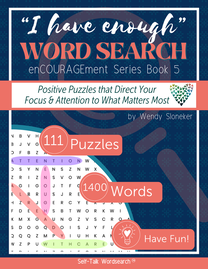 NEW BOOK RELEASE Book 5 of Self-Talk Wordsearch™ is now LIVE and available on Amazon. This is the most “manifest-y” book I’ve published so far. It works with a very subtle, but critical element in the Law of Attraction. It’s the aspect and perspective of “ already having enough” of a desired result. This is notoriously difficult for us humans. It’s the part and place where many give up on working with LOA altogether. More specific thoughts, perspectives, openings, and yes, self-talk is how we can more easily develop our skills. Including the belief of already having enough. When we decide we have enough (love, time, money, etc) -even just enough for this moment - we create capacity for more. We also allow for more to come. When we have enough, we create more than enough. This may sound odd, but still ring true. This is also the book to get and play in if you’re looking to simplify and identify more of what you already have in a gratitude practice or in a recovery program. Get your copy here: https://a.co/d/fG7cS2l 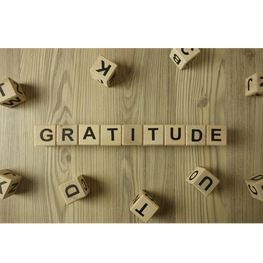 I got inspired. And I also remembered something. November is called Gratitude Month in some communities. It can be this community, for this month too. Ground rules for finding and feeling gratitude: Getting, being, and feeling gratitude is not a “should”. Not ever. In fact, thoughts like “I should…”, “I better…”, or “I need to…” can bring about bitterness, frustration, judgement, and resentment instead of the desired result. Secret sauce: Allowing yourself the option to find gratitude is the game here. It is conscious and intentional… and fun. How: Ideally, you could allow yourself the option of finding gratitude (or a similar feeling like appreciation or care) with a sense of fun and with a wisdom that absolutely believes that it can, indeed, be found. Yep, by you. In minutes. For today. This is the game… and it’s also a practice. The puzzle to download is here. Print, play, and share as you like. I am glad you are here. Sending warmth and care your way, Wendy  End of October around here means we’re watching all of the Harry Potter* movies again. Each year we notice new and different layers of meaning, detail, and nuance… while enjoying all of the familiar favorites. This year was different in a new way. Let me share a little bit about how I came into close contact with my own personal facet of … Uncle Vernon Dursley. (If you haven’t read the books or seen the movies, this character, Vernon Dursley, is Harry Potter’s uncle by marriage. ) Totally shocking. Completely true. I was taken aback by the palpable knowing and realness of how I have an inner Uncle Vernon. Usually we talk about lead -& younger- characters we identify with in pop culture chat. So… kind of stunning and baffling that I would identify a source of truth with Uncle V, right? How? Why? Early on in the first movie of the whole series, Uncle Vernon goes to any, and many, lengths to prevent Harry from receiving a letter that will change his whole world, his perspective, his dreams… and even Harry’s identity. Check out this film snippet here as a refresher: https://youtu.be/J0im92OUk5A?si=3sU-mc3SqHM-2a7K The insight I got was: Uncle Vernon portrays resistance. And he does so, so beautifully. A very scared mind that won’t allow change or growth. Anything outside of his comfort zone that could be viewed (by others and himself) as “not normal” or “strange” is shut down… the sooner the better. Kind of like when I used to bolt, distract, or shut down painful feelings. My resistance was so immediate and habitual, it was unconscious. Of course it was a part of my mind trying to keep me safe. Being and feeling scared or untrusting of what is new that arrives FOR ME - my letter, if you will - is understandable. Did you notice? The more Uncle Vernon denied the letters to Harry, the more owls (conveyors/reminders) with letters (feelings) showed up? Same with feelings, my darlings… SAAAAME. Do you see this? Magic revealed When Harry received his letter, magic became known in his life. In his own dear self. Magic here in our world can feel impossible, I get that. Peace, calm, tranquility, a mastery over one’s mind and mindset can also feel impossible. But it is possible. And yes, it absolutely does feel like magic when we encounter it. Is it unlovely and not fun to share that I identified a bit with Uncle Vernon during my Potter watch-a-thon? It is. Is it true? Yes. That was my experience. Did magic come with this realization? Yes. And peace. These are characters. Well-worn characters with new, specific names and faces. And we each hold a bit of them. This is how we know them so well. How we identify them so easily. Yes, my resistance feels like the character portrayal called Uncle Vernon. Sometimes wisdom feels like Molly Weasely. Sometimes sorrow feels like Professor Severus Snape. Sometimes courage feels like Neville Longbottom. To me. And for me. They are not ME. (They are not you either, love.) I am not always like Uncle V. AND, here in my human self, I do hold resistance sometimes and get scared of the unfamiliar… like I saw it portrayed. I made a connection. The value of stories Stories hold keys and portals to understanding. Even when they offer unlovely truths, they are - at the very same time - also offering new worlds to me. The very same can be true for you as well. Yes, with different stories. Your magic awaits. It’s on the other side of resistance. *I and my company are unaffiliated with Harry Potter works, rights, and indicia. I offer this writing as that of a fan, reader and listener of the books, and watcher of the films only. Hello, hello… I won’t be doing much of the “talking” in this week’s post. I’m going to hand the proverbial mic to readers who have left reviews for my brand new books. Both the nonfiction, and the Self-Talk Wordsearch™ books. Let’s begin with the newest book: Heart Healing From Loss Self-Talk Wordsearch™ books have been getting a lot of love lately. And I am thrilled and gratified by the response! All 4 (four) books that are currently available come in 2 editions… regular print (12-13 point font size) and Large Print editions (16 point font). Each of these are gifts of self-care, attention, and enCOURAGEment… because growth takes guts. Heck, living sometimes takes guts too.
***Free, Printable Wordsearch Puzzles*** If you haven’t already downloaded the 10+ printable PDF puzzles, you can totally grab them here. Please include your birthday month on the form so you will receive the birthday bash puzzle the first day of your birthday month too! *** Curious about working with me directly? Schedule your free call today and we’ll talk about private support coaching. This is not the destination. Not by a long shot. |
Categories
All
|
